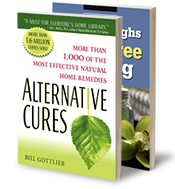[From the Introduction]
A Little Help From Some Friends
You’ll read about many different kinds of weight-loss supplements in The Natural Fat-Loss Pharmacy. And each one can help you lose weight in a slightly different way. Let’s look at them one by one. But remember, this is just an introduction—a brief summary. All the inspiring facts, and the scientific evidence to back them up, are in the rest of the book.
EGCG (green tea extract)—a safe way to boost metabolism.
This herbal extract helps boost your metabolism safely, so that you burn more calories. (By safely, we mean EGCG doesn’t raise your heart rate and blood pressure, one of the possible side effects of Ephedra.) For anybody trying to lose weight, increasing metabolic rate is crucial. Here’s why…
Our bodies were genetically programmed thousands of years ago, when we survived by hunting and gathering. Whenever we could literally get our hands on nourishment, we ate as much as we could—and our bodies stored the extra calories as fat for times of nutritional scarcity. Well, say goodbye to the savannah and hello to the supermarket. We don’t need to store fat anymore. But try telling that to your genes.
When you cut calories during a diet, your hunter-gatherer body “thinks” it’s starving and automatically lowers your metabolism, to retain fat. That’s why weight loss diets are usually very effective in the first few weeks—and why after that initial success, the pounds shed oh so slowly.
EGCG can help your body burn many more calories per day, countering this natural impediment to weight loss. Plus, EGCG is a powerful antioxidant, protecting your cells from damage and thereby improving the health of your brain, heart and immune, circulatory and nervous systems. It may even help prevent cancer.
CLA (conjugated linoleic acid)—Fat-Loss without dieting or exercise.
A large-scale, two-year scientific study shows that you can lose 5% of your body fat and gain 2% more calorie-burning, body-trimming muscle—withoutdiet or exercise—by taking this supplement for 3 months. Now that’s what we call a helping hand. No, make that about 20 hands…
HCA (hydroxycitric acid, orgarcinia cambogia)—slowing down the manufacture of fat.
This supplement works at the cellular level, reducing the formation of fat. In an eight-week study, people who took HCA lost 4 times as much weight as people taking a placebo, a fake look-alike pill. HCA can also reduce appetite (a crucial component of effective weight loss): in the same study, people taking HCA cut their calorie intake by 4%, while those on the placebo increased their intake by 3%.
MCT (medium chain triglycerides)—a macho way to prevent weight gain.
Several major scientific studies show that this unusual fat (found in coconut oil) can speed your metabolism, so you burn about 120 more calories a day. But the researchers who conducted the studies don’trecommend MCT for weight loss. Rather, they say taking a supplement of the fat is a great way to prevent the slow but frustratingly sure weight regain that afflicts almost everybody who diets. And their results show that the supplement works particularly well in men—and seems to target their spare tires! Hey guys, admit it: if you could have a little help “changing” your spare tire, wouldn’t you take it?
Chromium—balancing blood sugar.
This trace mineral helps normalize blood sugar metabolism. And that’s a big deal for weight loss. When blood sugar is stable, you’re less hungry between meals and tend to eat less.
You also store less fat and make more calorie-burning muscle. In one study, overweight women on a diet who took chromium lost 84% fat and 16% muscle, while a placebo group lost 92% muscle and 8% fat.
Chromium can also help prevent (and even treat) type II diabetes, a devastating disease (common “complications” include blindness and kidney failure) that often afflicts the overweight.
Carbohydrate inhibitors—making a low-carb diet more fun.
The tide has turned against low-carbohydrate diets: people have realized that it’s more or less impossible to drastically reduce intake of one of the three macronutrients for a lifetime. (The other two are protein and fat.) But low-carb, high-protein diets can be a good short-term way to shed extra fat—and carbohydrate-inhibitors make it a lot more easier to go on such a diet, because you don’t have to cut carbs quite as drastically. By taking either a starch- or sugar-blocker before a meal, you can have your cake (or at least a sensible slice) and eat it too.
Chitosan and other soluble fibers—foiling fat.
These supplements can help block the absorption of fat. In one study, people given chitosan before a fatty meal absorbed 20 to 28 fewer grams of fat—180 to 250 calories! Taking a fiber supplement before a meal can also help you feel fuller faster, so you’re less likely to overeat. And a fiber supplement slows down the absorption of the food you just ate, so you’re blood sugar stays balanced between meals, making it less likely you’ll snack.
5-HTP (5-hydroxy-L-tryptophan)—cutting carbohydrate cravings.
Scientific research shows that this amino acid dramatically reduces carbohydrate cravings—so much so, that overweight women who typically overdid it on starches and sugars effortlessly reduced their caloric intake by as much as 1000 calories a day, with more than 70% of those calories from carbs.
HMB (hydroxy methylbutyrate) and BCAA (branched-chain amino acids)—extra help for exercisers.
These supplements protect and build muscle, a must for anyone using intense exercise as a way to help shed pounds or prevent weight regain. HMB has also been shown to preventsarcopenia, the year-by-year, decade-by-decade loss of muscle mass that starts to afflict everybody around the age of 35, and is a factor in the gradual and seemingly inevitable gain of weight around middle-age (and around your middle!).
Savvy advice about the supplements we don’t recommend.
You’ll also read about several weight-loss supplements that are widely advertised and used but that we don’t recommend at the present time—either because there’s not enough scientific evidence to support their efficacy, or because they might be unsafe.
